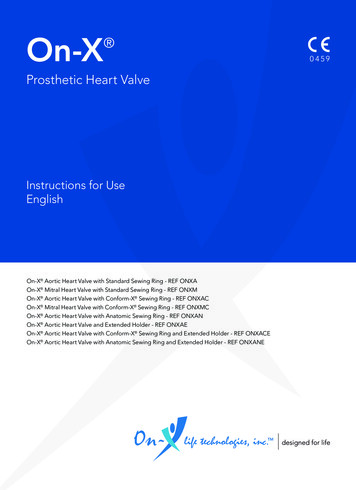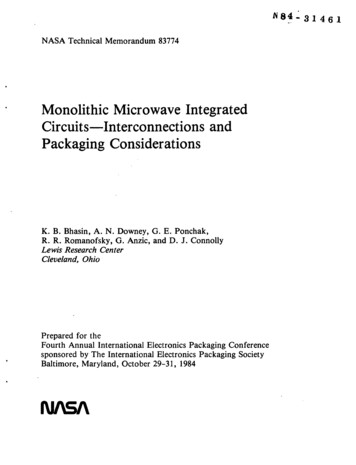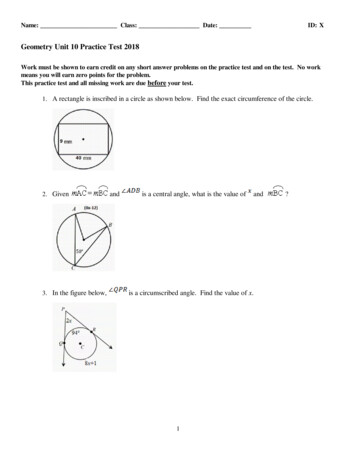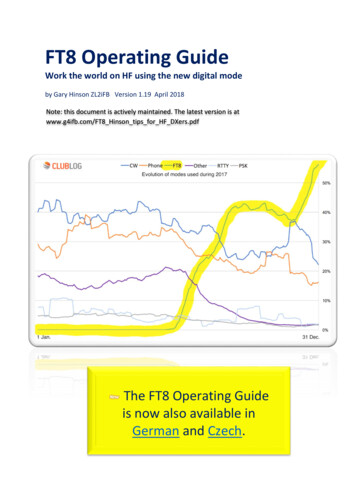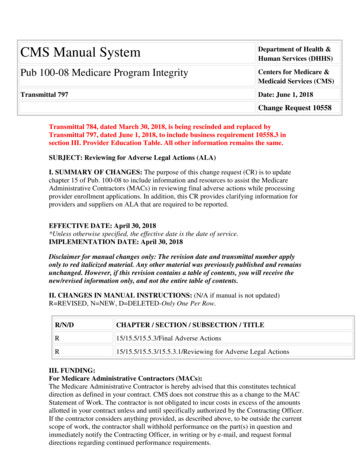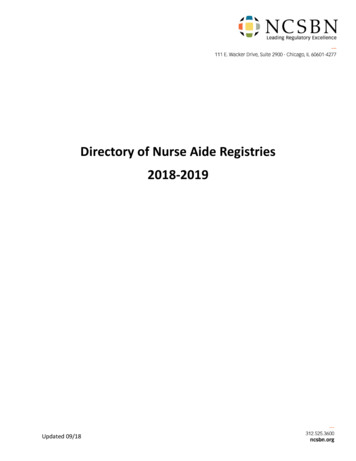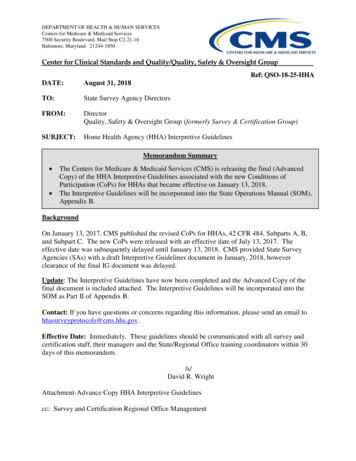
Transcription
DEPARTMENT OF HEALTH & HUMAN SERVICESCenters for Medicare & Medicaid Services7500 Security Boulevard, Mail Stop C2-21-16Baltimore, Maryland 21244-1850Center for Clinical Standards and Quality/Quality, Safety & Oversight GroupRef: QSO-18-25-HHADATE:August 31, 2018TO:State Survey Agency DirectorsFROM:DirectorQuality, Safety & Oversight Group (formerly Survey & Certification Group)SUBJECT:Home Health Agency (HHA) Interpretive GuidelinesMemorandum Summary The Centers for Medicare & Medicaid Services (CMS) is releasing the final (AdvancedCopy) of the HHA Interpretive Guidelines associated with the new Conditions ofParticipation (CoPs) for HHAs that became effective on January 13, 2018.The Interpretive Guidelines will be incorporated into the State Operations Manual (SOM),Appendix B.BackgroundOn January 13, 2017, CMS published the revised CoPs for HHAs, 42 CFR 484, Subparts A, B,and Subpart C. The new CoPs were released with an effective date of July 13, 2017. Theeffective date was subsequently delayed until January 13, 2018. CMS provided State SurveyAgencies (SAs) with a draft Interpretive Guidelines document in January, 2018, howeverclearance of the final IG document was delayed.Update: The Interpretive Guidelines have now been completed and the Advanced Copy of thefinal document is included attached. The Interpretive Guidelines will be incorporated into theSOM as Part II of Appendix B.Contact: If you have questions or concerns regarding this information, please send an email tohhasurveyprotocols@cms.hhs.gov.Effective Date: Immediately. These guidelines should be communicated with all survey andcertification staff, their managers and the State/Regional Office training coordinators within 30days of this memorandum./s/David R. WrightAttachment-Advance Copy HHA Interpretive Guidelinescc: Survey and Certification Regional Office Management
CMS-3819-F Medicare and Medicaid Program: Conditions of Participation for Home Health AgenciesInterpretive GuidelinesSubpart A--General Provisions§484.1 Basis and scope.§484.1 (a) Basis. This part is based on:§484.1(a)(1)Sections 1861(o) and 1891 of the Act, which establish the conditions that an HHA must meet inorder to participate in the Medicare program and which, along with the additional requirementsset forth in this part, are considered necessary to ensure the health and safety of patients; and§484.1(a)(2)Section 1861(z) of the Act, which specifies the institutional planning standards that HHAsmust meet.§484.1(b) Scope. The provisions of this part serve as the basis for survey activities for thepurpose of determining whether an agency meets the requirements for participation inthe Medicare program.§484.2 Definitions.As used in subparts A, B, and C, of this part-Branch office means an approved location or site from which a home health agency providesservices within a portion of the total geographic area served by the parent agency. The parent homehealth agency must provide supervision and administrative control of any branch office. It isunnecessary for the branch office to independently meet the conditions of participation as a homehealth agency.Clinical note means a notation of a contact with a patient that is written, timed, and dated, andwhich describes signs and symptoms, treatment, drugs administered and the patient’s reaction orresponse, and any changes in physical or emotional condition during a given period of time.In advance means that HHA staff must complete the task prior to performing any hands-on care orany patient education.Parent home health agency means the agency that provides direct support and administrativecontrol of a branch.Primary home health agency means the HHA which accepts the initial referral of a patient, andwhich provides services directly to the patient or via another health care provider underarrangements (as applicable).Proprietary agency means a private, for-profit agency.Public agency means an agency operated by a state or local government.Quality indicator means a specific, valid, and reliable measure of access, care outcomes, orsatisfaction, or a measure of a process of care.1
CMS-3819-F Medicare and Medicaid Program: Conditions of Participation for Home Health AgenciesInterpretive GuidelinesRepresentative means the patient’s legal representative, such as a guardian, who makes health-caredecisions on the patient’s behalf, or a patient-selected representative who participates in makingdecisions related to the patient’s care or well-being, including but not limited to, a family memberor an advocate for the patient. The patient determines the role of the representative, to the extentpossible.Subdivision means a component of a multi-function health agency, such as the home caredepartment of a hospital or the nursing division of a health department, which independently meetsthe conditions of participation for HHAs. A subdivision that has branch offices is considered aparent agency.Summary report means the compilation of the pertinent factors of a patient’s clinical notes that issubmitted to the patient’s physician.Supervised practical training means training in a practicum laboratory or other setting in which thetrainee demonstrates knowledge while providing covered services to an individual under the directsupervision of either a registered nurse or a licensed practical nurse who is under the supervision ofa registered nurse.Verbal order means a physician order that is spoken to appropriate personnel and later put inwriting for the purposes of documenting as well as establishing or revising the patient’s plan ofcare.Subpart B--Patient CareG350§484.40 Condition of participation: Release of patient identifiable OASIS information.The HHA and agent acting on behalf of the HHA in accordance with a written contract mustensure the confidentiality of all patient identifiable information contained in the clinical record,including OASIS data, and may not release patient identifiable OASIS information to the public.Interpretive Guidelines §484.40An agent acting on behalf of the HHA is a person or organization, other than an employee of the agencythat performs certain functions on behalf of, or provides certain services under contract or arrangement.HHAs often contract with specialized software vendors to submit OASIS data and are commonly referredto by the HHA as the Third-Party vendor.HHAs and their agents must develop and implement policies and procedures to protect the security of allpatient identifiable information contained in electronic format that they create, receive, maintain, andtransmit. The agreements between the HHA and OASIS vendors must address policies and procedures toprotect the security of such electronic records in order to: Ensure the confidentiality, integrity, and availability of all electronic records they create, receive,maintain, or transmit; Identify and protect against reasonably anticipated threats to the security or integrity of theelectronic records;2
CMS-3819-F Medicare and Medicaid Program: Conditions of Participation for Home Health AgenciesInterpretive Guidelines Protect against reasonably anticipated, impermissible uses or disclosures; and, Ensure compliance by their workforceThe HHA is ultimately responsible for compliance with these confidentiality requirements and is theresponsible party if the agent does not meet the requirements.(See also §484.50(c)(6) Patient Rights)G370§484.45 Condition of participation: Reporting OASIS information.HHAs must electronically report all OASIS data collected in accordance with §484.55.Interpretive Guidelines §484.45The OASIS data collection set must include the data elements listed in §484.55(c)(8) and be collected andupdated per the requirements under §484.55(d).G372§484.45(a) Standard: Encoding and transmitting OASIS data.An HHA must encode and electronically transmit each completed OASIS assessment to the CMSsystem, regarding each beneficiary with respect to which information is required to be transmitted(as determined by the Secretary), within 30 days of completing the assessment of the beneficiary.Interpretive Guidelines §484.45(a)“CMS system” means the national Quality Improvement Evaluation System, Assessment Submission andProcessing (QIES ASAP) system.“Encode” means to enter OASIS information into a computer.“Transmit” means electronically send OASIS information, from the HHA directly to the CMS system.An HHA must transmit a completed OASIS to the CMS system for all Medicare patients, Medicaidpatients, and patients utilizing any federally funded health plan options that are part of the Medicareprogram (e.g., Medicare Advantage (MA) plans). An HHA must also transmit an OASIS assessment forall Medicaid patients receiving services under a waiver program receiving services subject to theMedicare Conditions of Participation as determined by the State.Exceptions to the transmittal requirements are patients: Under age 18; Receiving maternity services; Receiving housekeeping or chore services only; Receiving only personal care services; and3
CMS-3819-F Medicare and Medicaid Program: Conditions of Participation for Home Health AgenciesInterpretive Guidelines Patients for whom Medicare or Medicaid insurance is not billed.As long as the submission time frame is met, HHAs are free to develop schedules for transmission of theOASIS assessments that best suit their needs.G374§484.45(b) Standard: Accuracy of encoded OASIS data.The encoded OASIS data must accurately reflect the patient's status at the time of assessment.Interpretive Guidelines §484.45(b)“Accurate” means that the OASIS data transmitted to CMS is consistent with the current status of thepatient at the time the OASIS was completed.G376§484.45(c) Standard: Transmittal of OASIS data. An HHA must—G378§484.45(c)(1) For all completed assessments, transmit OASIS data in a format that meets therequirements of paragraph (d) of this section.Interpretive Guidelines §484.45(c)(1)Successful transmission of OASIS data is verified through validation and feedback reports from QIESASAP.G380§484.45(c)(2) Successfully transmit test data to the QIES ASAP System or CMS OASIS contractor.Interpretive Guidelines §484.45(c)(2)The purpose of making a test transmission to the QIES ASAP system or CMS OASIS contractor is toestablish connectivity. Prior to the initial certification survey, HHAs must demonstrate connectivity tothe OASIS QIES ASAP system by-1. Testing transmission of start of care or resumption of care OASIS data that passes CMS edit checks tothe QIES ASAP System or CMS OASIS contractor; and2. Receiving validation reports back from the QIES ASAP system confirming successful transmission ofthe test data that is verified on-site during the survey.Note: the process for establishing test connectivity is detailed in the QIES technical support and theOASIS Submission Users Guide.4
CMS-3819-F Medicare and Medicaid Program: Conditions of Participation for Home Health AgenciesInterpretive GuidelinesG382§484.45(c)(3)Transmit data using electronic communications software that complies with theFederal Information Processing Standard (FIPS 140-2, issued May 25, 2001) from the HHA or theHHA contractor to the CMS collection site.Interpretive Guidelines §484.45(c)(3)HHAs may directly transmit OASIS data (to the national data repository) via jHAVEN (i.e., the HomeAssessment Validation and Entry System, which is an application that allows providers to collect andmaintain agency, patient and OASIS assessment data) or other software that conforms to the FIPS 140-2.G384§484.45(c)(4)Transmit data that includes the CMS-assigned branch identification number, asapplicable.G386§484.45(d) Standard: Data Format.The HHA must encode and transmit data using the software available from CMS or software thatconforms to CMS standard electronic record layout, edit specifications, and data dictionary, andthat includes the required OASIS data set.G406§484.50 Condition of participation: Patient rights.The patient and representative (if any), have the right to be informed of the patient’s rights in a languageand manner the individual understands. The HHA must protect and promote the exercise of these rights.G408§484.50(a) Standard: Notice of rights.The HHA must-G410§484.50(a)(1) Provide the patient and the patient’s legal representative (if any), the followinginformation during the initial evaluation visit, in advance of furnishing care to the patient:Interpretive Guidelines §484.50(a)(1)5
CMS-3819-F Medicare and Medicaid Program: Conditions of Participation for Home Health AgenciesInterpretive GuidelinesThe term “in advance” is defined at §484.2. “In advance” means that HHA staff must complete the taskprior to performing any hands-on care or any patient education.A “legal representative” is an individual who has been legally designated or appointed as the patient’shealth care decision maker. When there is no evidence that a patient has a legal representative, such asa guardianship, a power of attorney for health care decision-making, or a designated health care agent,the HHA must provide the information directly to the patient.The initial evaluation visit is the initial assessment visit that is conducted to determine the immediatecare and support needs of the patient.G412§484.50(a)(1)(i) Written notice of the patient’s rights and responsibilities under this rule, and theHHA’s transfer and discharge policies as set forth in paragraph (d) of this section. Written noticemust be understandable to persons who have limited English proficiency and accessible toindividuals with disabilities;Interpretive Guidelines §484.50(a)(1)(i)We expect HHA patients to be able to confirm, upon interview, that their rights and responsibilities, aswell as the transfer and discharge policies of the HHA, were understandable and accessible.To ensure patients receive appropriate notification: Written notice to the patient or their representative of their rights and responsibilities under thisrule should be provided via hard copy unless the patient requests that the document be providedelectronically. If a patient or his/her representative’s understanding of English is inadequate for the patient’scomprehension of his/her rights and responsibilities, the information must be provided in alanguage or format familiar to the patient or his/her representative. Language assistance should be provided through the use of competent bilingual staff, staffinterpreters, contracts or formal arrangements with local organizations providing interpretation,translation services, or technology and telephonic interpretation services. All agency staff should be trained to identify patients with any language barriers which mayprevent effective communication of the rights and responsibilities. Staff that have on-goingcontact with patients who have language barriers, should be trained in effective communicationtechniques, including the effective use of an interpreter.See §484.50(f) for discussion on communication of rights and responsibilities with patients who havedisabilities that may hinder communication with the HHA.G414§484.50(a)(1)(ii) Contact information for the HHA administrator, including the administrator’sname, business address, and business phone number in order to receive complaints.6
CMS-3819-F Medicare and Medicaid Program: Conditions of Participation for Home Health AgenciesInterpretive GuidelinesG416§484.50(a)(1)(iii) An OASIS privacy notice to all patients for whom the OASIS data is collected.Interpretive Guidelines §484.50(a)(1)(iii)Use of the OASIS Privacy Notice is required under the Federal Privacy Act of 1974 and must be used inaddition to other notices that may be required by other privacy laws and regulations. The OASISprivacy notice is available in English and Spanish on the CMS website. The OASIS Privacy Noticemust be provided at the time of the initial evaluation visit.G418§484.50(a)(2) Obtain the patient’s or legal representative’s signature confirming that he or she hasreceived a copy of the notice of rights and responsibilities.G420§484.50(a)(3) Provide verbal notice of the patient’s rights and responsibilities in the individual’sprimary or preferred language and in a manner the individual understands, free of charge, withthe use of a competent interpreter if necessary, no later than the completion of the second visitfrom a skilled professional as described in §484.75.Interpretive Guidelines §484.50(a)(3)If an HHA patient speaks a language that the HHA has not translated into written material, the HHAmay delay oral explanation of the patient’s rights and responsibilities until an interpreter is present(either physically, electronically or telephonically) to verbally translate. However, this may be delayeduntil no later than the second visit. In addition, such oral explanation does not satisfy the requirementthat the HHA provide written notice of a patient’s rights and responsibilities in advance of providingcare in accordance with §484.50(a)(1)(i).HHAs should document that verbal discussion of rights took place and that the patient and/orrepresentative was able to confirm her/his understanding of rights.G422§484.50(a)(4) Provide written notice of the patient’s rights and responsibilities under this rule andthe HHA’s transfer and discharge policies as set forth in paragraph (d) of this section to a patientselected representative within 4 business days of the initial evaluation visit.G424§484.50(b) Standard: Exercise of rights.7
CMS-3819-F Medicare and Medicaid Program: Conditions of Participation for Home Health AgenciesInterpretive Guidelines§484.50(b)(1) If a patient has been adjudged to lack legal capacity to make health care decisions asestablished by state law by a court of proper jurisdiction, the rights of the patient may beexercised by the person appointed by the state court to act on the patient’s behalf.§484.50(b)(2) If a state court has not adjudged a patient to lack legal capacity to make health caredecisions as defined by state law, the patient’s representative may exercise the patient’s rights.§484.50(b)(3) If a patient has been adjudged to lack legal capacity to make health care decisionsunder state law by a court of proper jurisdiction, the patient may exercise his or her rights to theextent allowed by court order.Interpretive Guidelines §484.50(b)The HHA should obtain official documentation of: (1) any adjudication by a court that indicates that apatient lacks the legal capacity to make his or her own health care decisions; and (2) the name of anyperson identified by the court who may exercise the patient’s rights.G426§484.50(c) Standard: Rights of the patient.The patient has the right to—G428§484.50(c)(1)Have his or her property and person treated with respect;Interpretive Guidelines §484.50(c)(1)Respect for Property: The patient has the right to expect the HHA staff will respect his or her propertyand person while in the patient’s home. The HHA must ensure that during home visits the patient’sproperty, both inside and outside the home, is not stolen, damaged, or misplaced by HHA staff.Respect for Person: The HHA must consider and accommodate any patient requests within theparameters of the assessment and plan of care, and the patient must be treated by the HHA as an activepartner in the delivery of care. The HHA should make all reasonable attempts to respect the preferencesof the patient regarding the services that will be delivered, such as the HHA visit schedule, which shouldbe made at the convenience of the patient rather than of the agency personnel. The HHA must keep thepatient informed of the visit schedule and timely and promptly notify the patient when scheduledservices are changed.G430§484.50(c)(2) Be free from verbal, mental, sexual, and physical abuse, including injuries ofunknown source, neglect and misappropriation of property;8
CMS-3819-F Medicare and Medicaid Program: Conditions of Participation for Home Health AgenciesInterpretive GuidelinesInterpretive Guidelines §484.50(c)(2)The patient has a right to be free from abuse from the HHA staff and others in his or her homeenvironment. The HHA should address any allegations or evidence of patient abuse to determine ifimmediate care is needed, a change in the plan of care is indicated, or if a referral to an appropriateagency is warranted. (State laws vary in the reporting requirements of abuse. HHAs should beknowledgeable of these laws and comply with the reporting requirements.) In addition, the HHA shouldintervene immediately if, as indicated by the circumstances, any injury is the result of an HHA staffmember’s actions. The HHA should also immediately remove staff from patient care if there areallegations of misconduct related to abuse or misappropriation of property.“Abuse” means the willful infliction of injury, unreasonable confinement, intimidation, or punishmentwith resulting physical harm, pain or mental anguish. Abuse may be verbal, mental, sexual, or physicaland includes abuse facilitated or enabled through the use of technology.“Verbal abuse” refers to abuse perpetrated through any use of insulting, demeaning, disrespectful, oral,written or gestured language directed toward and in the presence of the client.“Mental abuse” is a type of abuse that includes, but is not limited to, humiliation, harassment, and threatsof punishment or deprivation, sexual coercion and intimidation (e.g. living in fear in one’s own home).“Sexual abuse” is a type of abuse that includes any incident where a beneficiary is coerced, manipulated,or forced to participate in any form of sexual activity for which the beneficiary did not give affirmativepermission (or gave affirmative permission without the mental capacity required to give permission), orsexual assault against a beneficiary who is unable to defend him/herself.“Physical abuse” refers to abuse perpetrated through any action intended to cause physical harm or pain,trauma or bodily harm (e.g., hitting, slapping, punching, kicking, pinching, etc.). It includes the use ofcorporal punishment as well as the use of any restrictive, intrusive procedure to control inappropriatebehavior for purposes of punishment.“Injury of unknown” source is an injury that was not witnessed by any person and the source of theinjury cannot be explained by the patient.“Misappropriation of property” is theft or stealing of items from a patient’s home. The HHA staff mustinvestigate and take immediate action on any allegations of misappropriation of patient property byHHA staff and refer to authorities when appropriate.Neglect means a failure to provide goods and/or services necessary to avoid physical harm, mentalanguish or mental illness.G432§484.50(c)(3) Make complaints to the HHA regarding treatment or care that is (or fails to be)furnished, and the lack of respect for property and/or person by anyone who is furnishing serviceson behalf of the HHA;Interpretive Guidelines §484.50(c)(3)The HHA should have written policies and procedures that address the acceptance, processing, review,and resolution of patient complaints, including complaint intake procedures, timeframes for9
CMS-3819-F Medicare and Medicaid Program: Conditions of Participation for Home Health AgenciesInterpretive Guidelinesinvestigations, documentation, and potential outcomes and actions that the HHA may take to resolvepatient complaints. See also §484.50(e) Investigation of complaints.The HHA should record, in both the clinical record and the patient’s home folder, that the patient wasprovided with information regarding his or her right to lodge a complaint to the HHA.G434§484.50(c)(4) Participate in, be informed about, and consent or refuse care in advance of andduring treatment, where appropriate, with respect to –(i) Completion of all assessments;(ii) The care to be furnished, based on the comprehensive assessment;(iii) Establishing and revising the plan of care;(iv) The disciplines that will furnish the care;(v) The frequency of visits;(vi) Expected outcomes of care, including patient-identified goals, and anticipated risks andbenefits;(vii) Any factors that could impact treatment effectiveness; and(viii) Any changes in the care to be furnished.Interpretive Guidelines §484.50(c)(4)The patient’s informed consent on the items (i)-(viii) is not intended to be recorded on a single signedform. Informed consent and patient participation takes place on an ongoing basis as the patient’s carechanges and evolves during his or her episodes of care. There must be evidence in the patient’s medicalrecord that, both initially and as changes occur in the patient’s care, the patient was consulted andconsented to planned services and care.“Participation” means that the patient is given options regarding care choices and preferences. Forexample, patient preferences should be respected in encouraging the patient to choose between a bath anda shower, unless there are physical restrictions or medical contraindications that limit patient choice.“Informed” means that all aspects of the planned care and services, and the manner in which the care andservices will be delivered, are reviewed by HHA staff with the patient and that, during such review, HHAstaff solicits the patient’s agreement or disagreement.When there is a change to the plan of care, whether initiated by the HHA/physician or at the request of thepatient, documentation in the clinical record should indicate whether the patient was informed of andagreed to the changes.G436§484.50(c)(5) Receive all services outlined in the plan of care.10
CMS-3819-F Medicare and Medicaid Program: Conditions of Participation for Home Health AgenciesInterpretive GuidelinesG438§484.50(c)(6) Have a confidential clinical record. Access to or release of patient information andclinical records is permitted in accordance with 45 CFR parts 160 and 164.Interpretive Guidelines §484.50(c)(6)45 CFR Part 160 and 164 pertain to requirements of the Health Insurance Portability and AccountabilityAct of 1996 (“HIPAA”). The HIPAA Privacy Rule (45 CFR Part 160 and Subparts A and E of Part 164),Security Rule (45 CFR Part 160 and Subparts A and C of Part 164), and Breach Notification Rule (45CFR §§ 164.400–414) protect the privacy and security of health information and provide individuals withcertain rights regarding their health information as follows: The Privacy Rule sets national standards for covered entities (health plans, health care clearinghouses,and health care providers that conduct certain health care transactions electronically) and theirbusiness associates, including appropriate safeguards to protect the privacy of protected healthinformation (PHI) and the limits and conditions under which PHI is permitted or required to be usedor disclosed;The Security Rule specifies safeguards that covered entities and their business associates mustimplement to protect the confidentiality, integrity, and availability of electronic protected healthinformation (ePHI)The Breach Notification Rule requires covered entities and their business associates to notify affectedindividuals, U.S. Department of Health & Human Services (HHS), and in some cases, the media of abreach of unsecured PHI.The HIPAA Privacy Rule also gives certain patients’ rights over their health information, including rightsto examine and obtain a copy of their health records, and to request corrections.HHAs have unique concerns and risks regarding staff and contractors who transport documents and/orelectronic devices containing PHI, such as during their visits to patient’s homes. Compliance with§484.50(c)(6) is evidenced by documentation of HIPAA training for all staff and monitoring HIPAAcompliance to manage the risk of inappropriate PHI disclosure or unsecured ePHI. Each covered entityand business associate is responsible for ensuring its compliance with the HIPAA Privacy, Security, andBreach Notification Rules, as applicable, including consulting appropriate counsel as necessary.G440§484.50(c)(7) Be advised of –(i) The extent to which payment for HHA services may be expected from Medicare, Medicaid, orany other Federally-funded or Federal aid program known to the HHA,(ii) The charges for services that may not be covered by Medicare, Medicaid, or any otherFederally-funded or Federal aid program known to the HHA,(iii) The charges the individual may have to pay before care is initiated; and(iv) Any changes in the information provided in accordance with paragraph (c)(7) of this sectionwhen they occur. The HHA must advise the patient and representative (if any), of these changes as11
CMS-3819-F Medicare and Medicaid Program: Conditions of Participation for Home Health AgenciesInterpretive Guidelinessoon as possible, in advance of the next home health visit. The HHA must comply with the patientnotice requirements at 42 CFR 411.408(d)(2) and 42 CFR 411.408(f).Interpretive Guidelines §484.50(c)(7)There must be evidence that, prior to initiation of HHA services, the patient was advised of: (1) the extentto which planned services would be covered by Medicare; and (2) the expected out-of-pocket cost to thepatient for the services. This provides the patient with an opportunity to make an informed decisionregarding the provision of services by the HHA for which he or she may have partial or total liability.If, after the services begin, a change occurs to the patient’s status that necessitates the provision ofnew/additional services, the same notification must occur regarding extent of payment and patientliability, prior to the initiation of such new/additional services.G442§484.50(c)(8) Receive proper written notice, in advance of a specific service being furnished, if theHHA believes that the service may be non-covered care; or in advance of the HHA reducing orterminating on-going care. The HHA must also comply with the requirements of 42 CFR 405.1200through 405.1204.Interpretive Guidelines §484.50(c)(8)§405.1200 through §405.1204
As long as the submission time frame is met, HHAs are free to develop schedules for transmission of the OASIS assessments that best suit their needs. G374 §484.45(b) Standard: Accuracy of encoded OASIS data. The encoded OASIS data must accurately reflect the patient's status at the time of assessment. Interpretive Guidelines §484.45(b)
